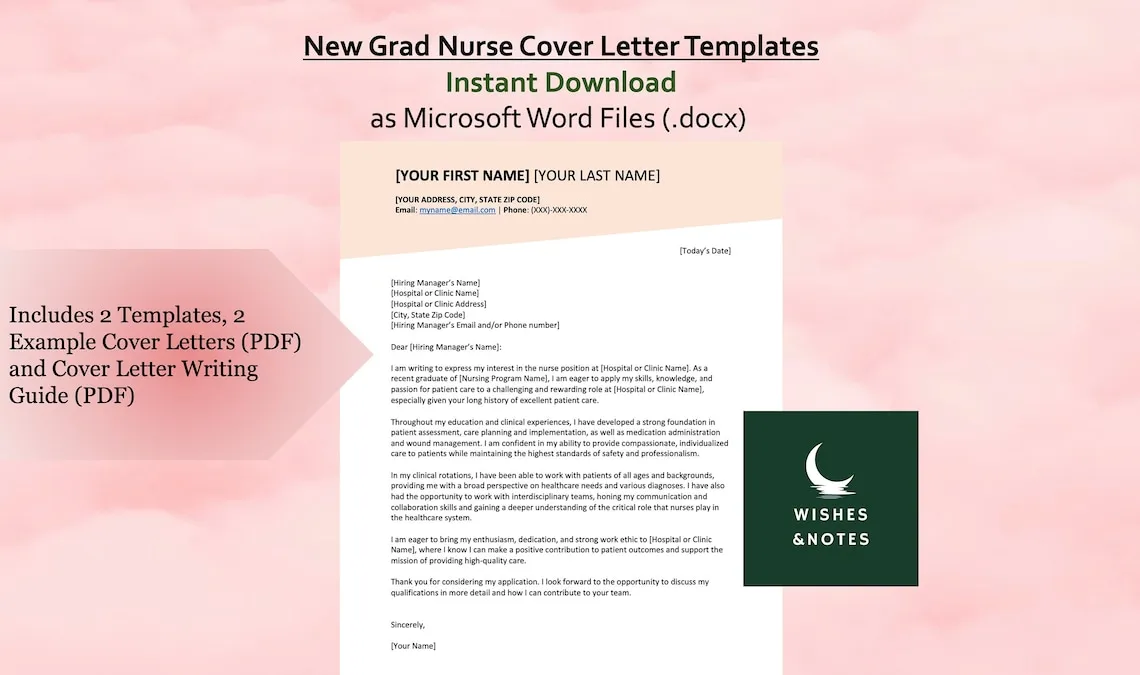What Is a Cover Letter for New Grad Nurses?
A cover letter is a crucial document accompanying your nursing resume when applying for a job as a new graduate nurse. It serves as your introduction to the hiring manager and allows you to highlight your qualifications, skills, and passion for nursing. Unlike your resume, which provides a factual overview of your experience and education, a cover letter allows you to showcase your personality, explain your career goals, and demonstrate why you are the perfect fit for the position. It’s your chance to make a strong first impression and persuade the employer to invite you for an interview. A well-written cover letter can significantly increase your chances of landing your dream nursing job.
Key Components of a New Grad Nurse Cover Letter
Understanding the essential elements of a new grad nurse cover letter is key to crafting a compelling document. These components work together to present a comprehensive view of your qualifications and aspirations. Each section serves a unique purpose in conveying your suitability for the role, from the initial greeting to the concluding call to action.
Header Information
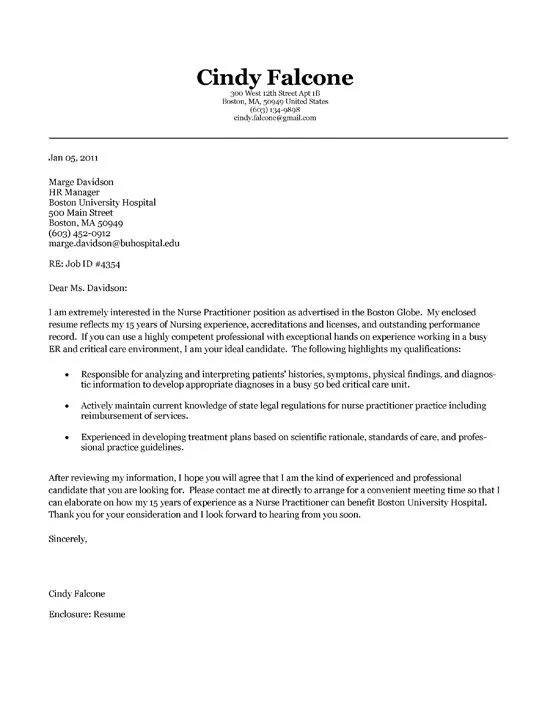
The header is the first thing a hiring manager sees, so it’s important to get it right. It should include your contact information, the date, and the hiring manager’s details. This section ensures the employer knows how to reach you and demonstrates your attention to detail. Ensure your contact information is accurate and professional. Always use a professional email address.
Applicant’s Contact Information
This section should include your full name, phone number, and email address. Make sure all information is current and easily accessible. Consider including a link to your LinkedIn profile if you have one. This allows the hiring manager to quickly find more information about you.
Date
The date is the day you are submitting your cover letter. Place it directly below your contact information. This provides a reference for the employer regarding when the letter was sent.
Hiring Manager’s Contact Information
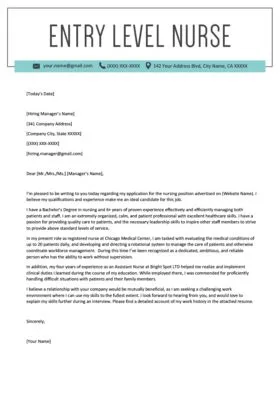
If possible, address the cover letter to a specific person (the hiring manager). Research the hiring manager’s name and title. If the information is unavailable, you can use a general salutation like ‘Dear Hiring Manager’. Include the hiring manager’s title, the name of the facility, and the facility’s address.
Professional Greeting
Start your cover letter with a professional greeting. ‘Dear Mr./Ms./Dr. [Last Name]’ is the preferred format if you know the hiring manager’s name. If you are unsure, use ‘Dear Hiring Manager’ or ‘Dear Nurse Recruitment Team’. Avoid overly casual greetings like ‘Hi’.
Body of the Cover Letter
The body of the cover letter is where you sell yourself and showcase your qualifications. It should consist of a few well-structured paragraphs. These paragraphs will highlight your key skills, education, and experiences. Keep the body concise, clear, and focused on what makes you the ideal candidate.
First Paragraph Introduce Yourself and State Your Intent
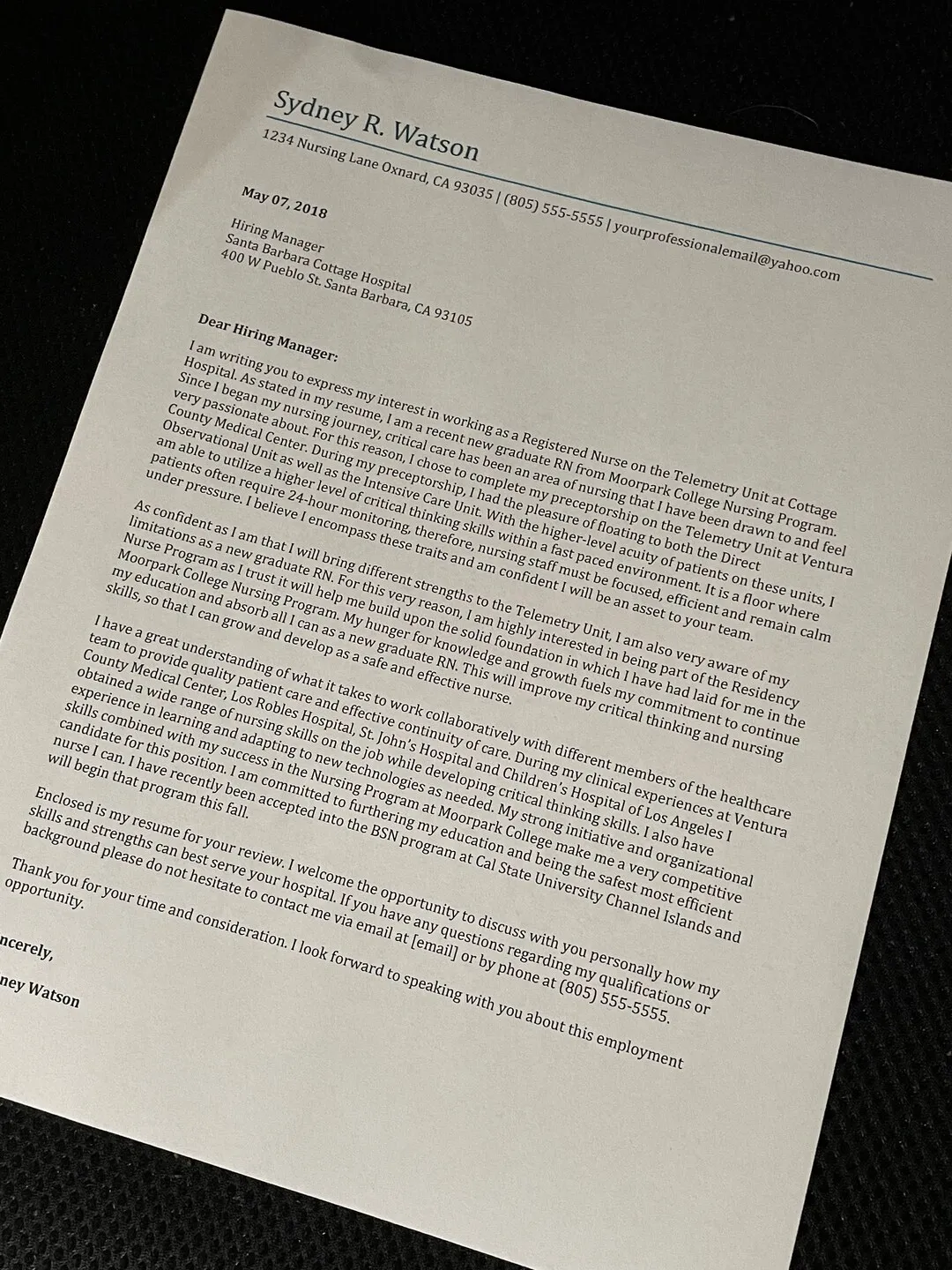
Start by introducing yourself and clearly stating the position you are applying for. Mention where you saw the job posting (e.g., online, through a contact). Briefly state why you are interested in the position and the organization. Express your enthusiasm and passion for nursing right from the beginning. This sets the tone and captures the reader’s attention.
Highlight Your Nursing Education and Skills
Emphasize your educational background, including your degree (e.g., BSN, ADN), the name of your nursing school, and your graduation date or expected graduation date. Mention any relevant coursework, certifications, or specializations you have. Highlight skills that are relevant to the job description, such as critical thinking, communication, teamwork, and patient care. Use specific examples from your clinical experiences to demonstrate these skills.
Emphasize Clinical Experience and Relevant Skills
Describe your clinical experiences, including the settings, the types of patients you cared for, and your specific responsibilities. Focus on experiences that align with the job requirements. Quantify your achievements whenever possible (e.g., ‘Successfully managed a caseload of 8 patients daily’). Mention any specific procedures or technologies you are proficient in. Tailor your descriptions to match the job’s needs, emphasizing the skills and experiences most relevant to the position.
Showcase Your Professionalism and Passion for Nursing
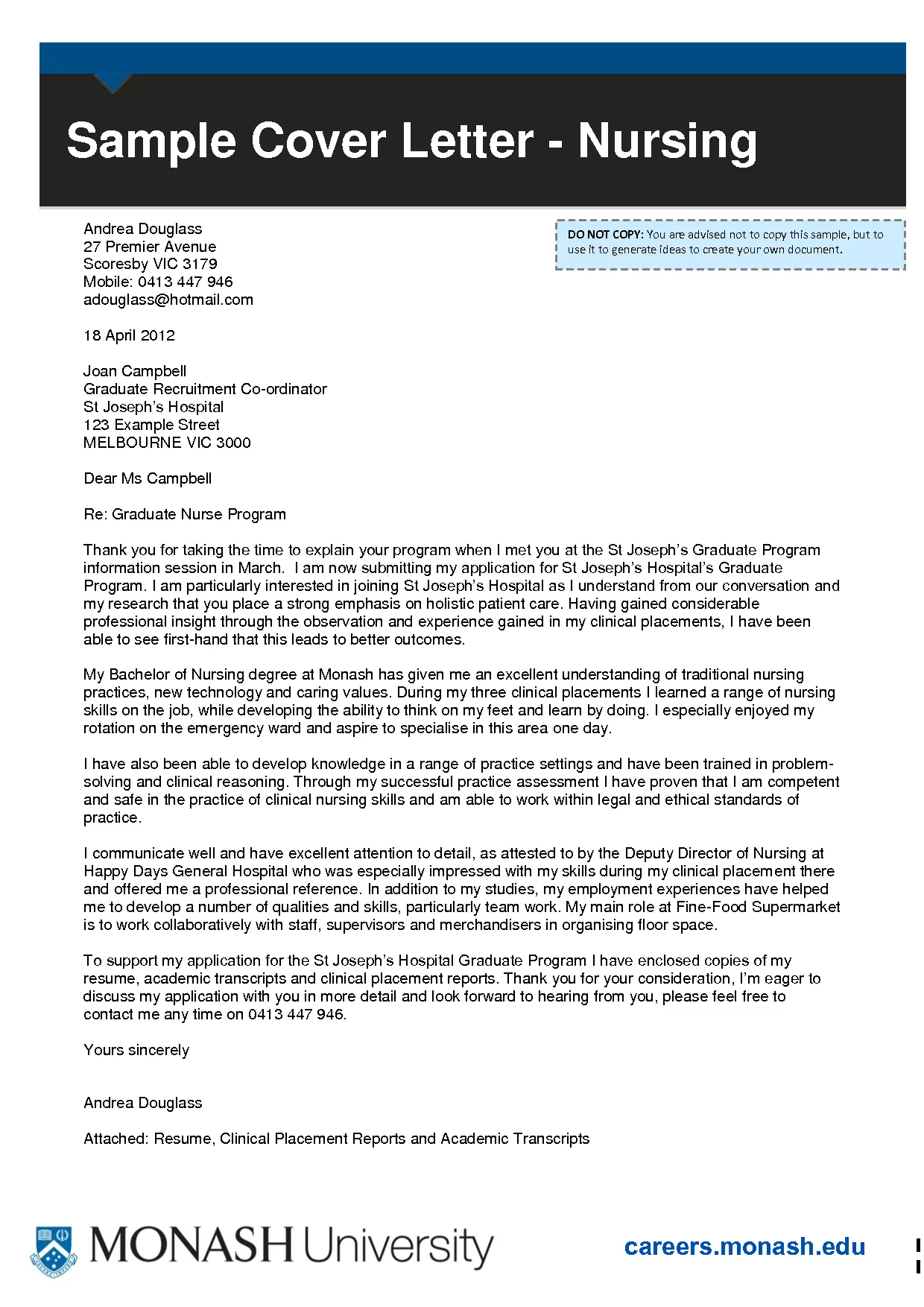
Convey your passion for nursing by expressing your commitment to patient care, your desire to learn and grow, and your understanding of the healthcare environment. Mention any professional affiliations or volunteer experiences. Describe your personal qualities that make you a good nurse, such as empathy, compassion, and strong work ethic. Show that you are eager to contribute positively to the healthcare team.
Closing and Call to Action
The closing is your final opportunity to leave a lasting impression. It should be polite, appreciative, and encourage the reader to take the next step. Make sure you end on a positive note and reiterate your interest in the position.
Express Gratitude
Thank the hiring manager for their time and consideration. Express your appreciation for the opportunity to apply and for reviewing your application. This shows respect and professionalism.
Include a Strong Closing
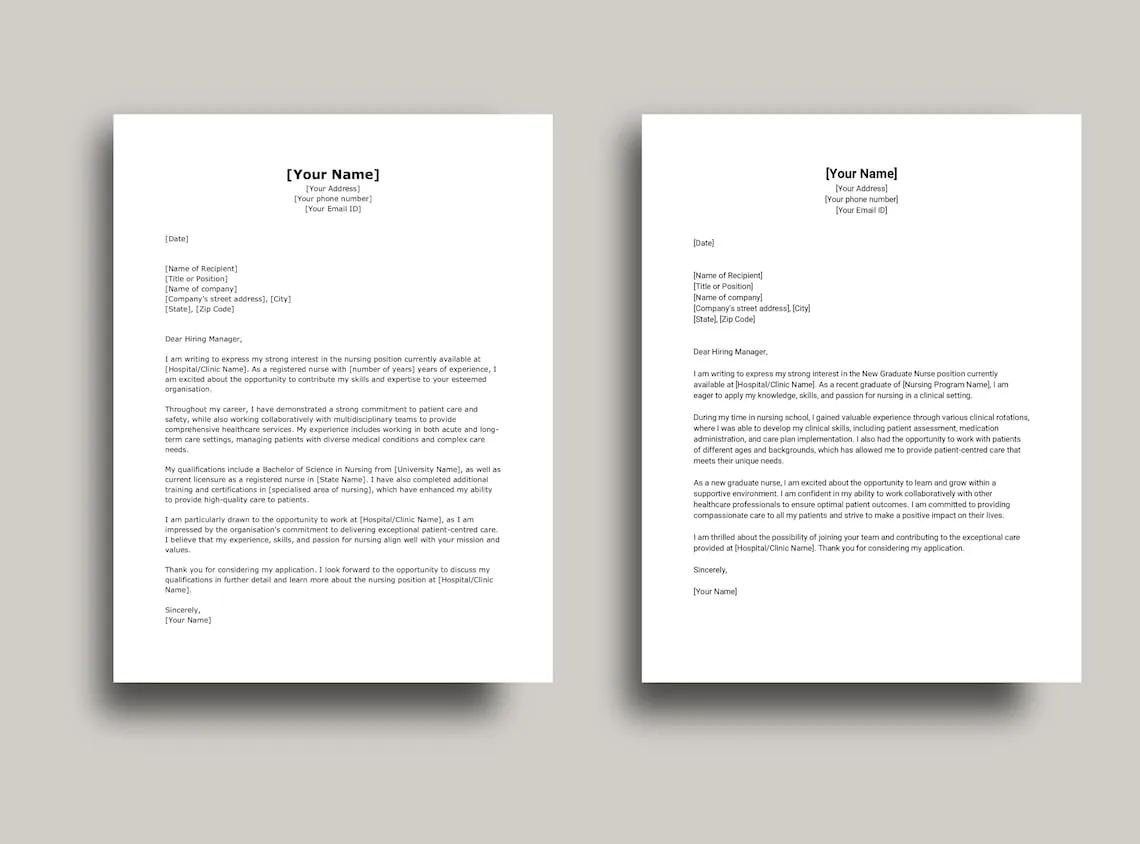
Reiterate your interest in the position and express your availability for an interview. Use a call to action, such as ‘I am eager to discuss my qualifications further’ or ‘I look forward to hearing from you soon.’ End with a professional closing, such as ‘Sincerely’ or ‘Best regards,’ followed by your typed name.
Cover Letter Examples for New Grad Nurses
Reviewing cover letter examples can provide excellent guidance. These examples offer insights into how to structure your letter, what information to include, and how to present your skills and experience effectively. Use these as a starting point and tailor them to your unique circumstances and the specific job you are applying for.
Example 1 Medical-Surgical Nursing
This example focuses on a new grad nurse applying for a medical-surgical position. It highlights experience with diverse patient populations, medication administration, wound care, and teamwork. The letter emphasizes a strong work ethic, compassion, and a commitment to providing excellent patient care. This example also demonstrates an ability to work in a fast-paced environment. The cover letter uses specific details about clinical rotations to emphasize relevant skills.
Example 2 Emergency Room Nursing
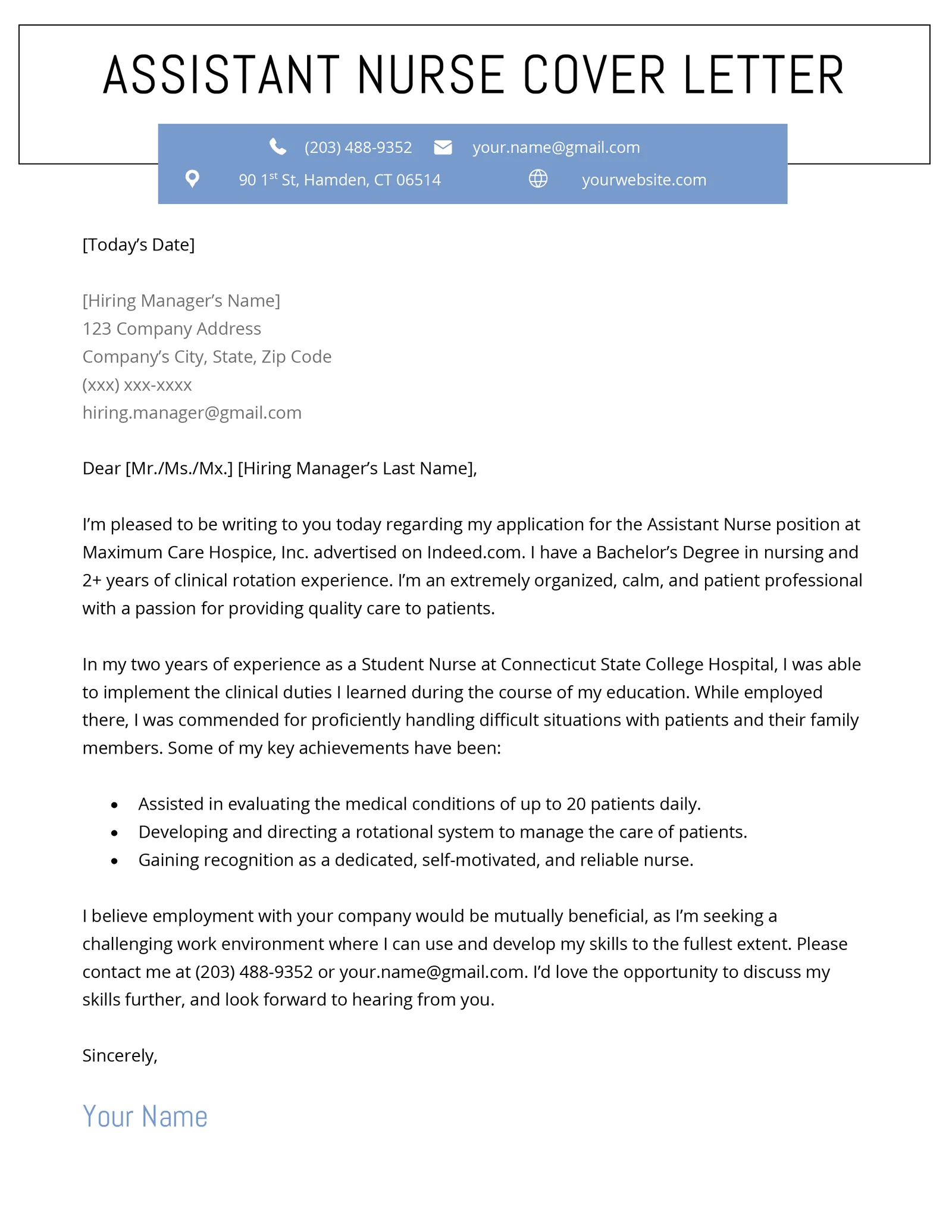
This cover letter example is for a new graduate nurse applying for an emergency room nursing position. It stresses the applicant’s ability to remain calm under pressure, prioritize tasks, and work efficiently. The letter showcases skills in rapid assessment, critical thinking, and effective communication with patients and medical teams. It also highlights experience with trauma and emergency situations, demonstrating a readiness to handle high-stress environments. This example uses strong action verbs to describe the candidate’s capabilities.
Example 3 Intensive Care Unit ICU Nursing
Here, the cover letter targets an ICU nursing position. It emphasizes experience with critical care patients, ventilator management, and continuous monitoring. The letter highlights the applicant’s knowledge of advanced life support techniques and ability to work as part of an interdisciplinary team. It stresses the candidate’s precision, attention to detail, and commitment to patient safety. The cover letter focuses on the candidate’s ability to handle complex cases.
Example 4 Pediatric Nursing
This cover letter example is tailored for a pediatric nursing position. It highlights experience in pediatric clinical settings, communication skills, and the ability to create a supportive environment for children and their families. The letter underscores the applicant’s empathy, patience, and understanding of child development. It also mentions any specialized training or certifications in pediatric care. This cover letter example uses language that shows compassion and understanding.
Example 5 Public Health Nursing
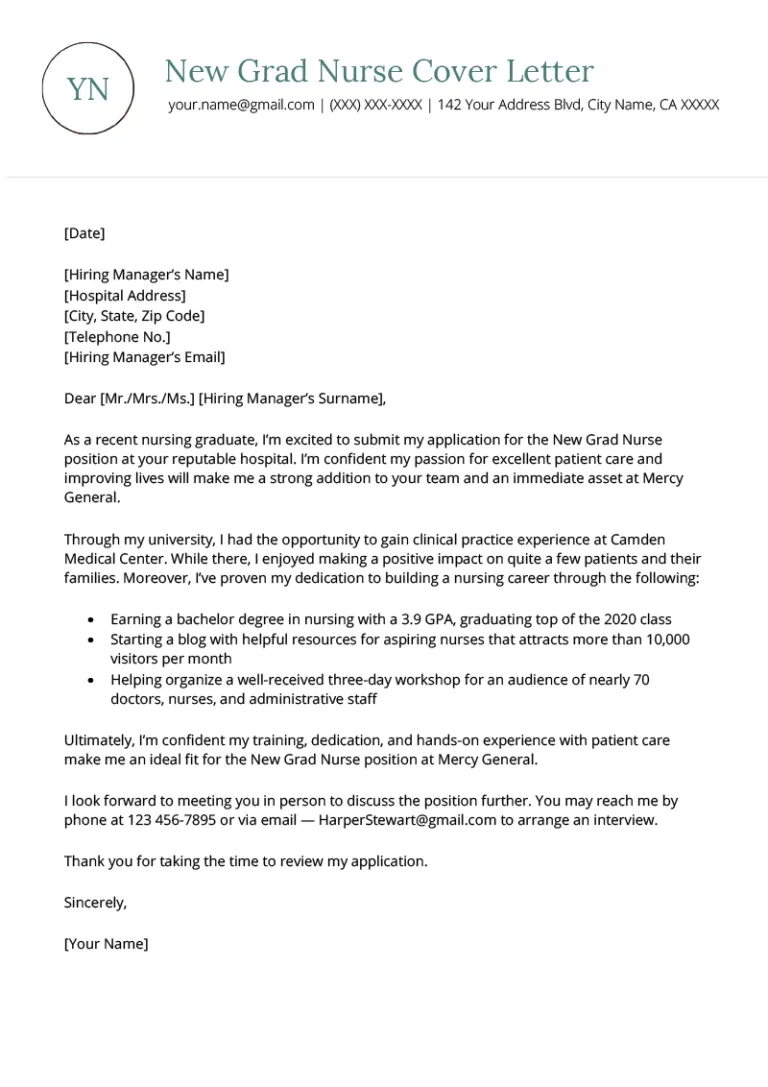
This example is designed for a public health nursing position. It emphasizes experience in community health settings, health education, and outreach programs. The letter highlights the applicant’s understanding of public health principles, cultural sensitivity, and ability to work with diverse populations. It also showcases any experience in disease prevention and health promotion. The cover letter is focused on community involvement and public health goals.
Tips for Writing a Standout Cover Letter
Writing a standout cover letter involves more than just listing your qualifications; it requires strategic planning, careful execution, and attention to detail. By following these tips, you can create a cover letter that captures the hiring manager’s attention and increases your chances of getting an interview.
Tailor Your Cover Letter to Each Job
Customize your cover letter for each job application. Review the job description carefully and identify the key skills and qualifications the employer is seeking. Highlight the relevant experiences and skills that match those requirements. Avoid using a generic cover letter; personalize it to demonstrate that you understand the specific needs of the role and the organization.
Proofread and Edit Carefully
Proofread your cover letter multiple times to catch any typos, grammatical errors, or inconsistencies. Ask a friend, family member, or career counselor to review your letter for feedback. A polished and error-free cover letter reflects professionalism and attention to detail. Pay close attention to sentence structure, word choice, and overall clarity.
Use Action Verbs
Use strong action verbs to describe your skills and accomplishments. Examples include ‘managed,’ ‘coordinated,’ ‘assessed,’ ‘implemented,’ ‘collaborated,’ and ‘achieved.’ This makes your descriptions more dynamic and engaging, demonstrating your abilities and what you have accomplished. Action verbs give the hiring manager a clearer picture of your capabilities.
Highlight Accomplishments
Whenever possible, quantify your achievements and provide specific examples. Instead of saying ‘Provided excellent patient care,’ say ‘Administered medications to 20+ patients daily, resulting in a 95% patient satisfaction rate.’ Highlighting accomplishments makes your cover letter more impactful and demonstrates your value to the employer. Use data and statistics to showcase your effectiveness.
Formatting and Design
The formatting and design of your cover letter are just as important as the content. A well-formatted cover letter is easy to read, professional in appearance, and reflects your attention to detail. Use a clean and professional format to ensure your cover letter is visually appealing.
Font and Font Size
Choose a professional and easy-to-read font, such as Times New Roman, Arial, or Calibri. Keep the font size between 10 and 12 points. Avoid using fancy or overly decorative fonts that can distract from the content. Ensure the font size is easily readable and consistent throughout the letter.
Margins and Spacing
Use standard margins (1 inch on all sides) and single or 1.15 line spacing. This ensures your cover letter looks clean and organized. Proper spacing makes the text easy to read and prevents the document from appearing cluttered. A well-spaced document is visually appealing and professional.
Common Mistakes to Avoid
Avoiding common mistakes can significantly improve the effectiveness of your cover letter. Being aware of these pitfalls helps you create a more polished and professional document that will impress hiring managers.
Generic Cover Letters
Avoid sending generic cover letters that could be used for any job. Tailor your letter to each specific position, highlighting the skills and experiences that are most relevant to the job requirements and the organization. Generic letters show a lack of interest and effort.
Typos and Grammatical Errors
Always proofread your cover letter carefully for any typos or grammatical errors. These errors can create a negative impression and make you seem unprofessional. Use spell-check and grammar-check tools, and ask someone else to review your letter before you submit it.
Overly Long Cover Letters
Keep your cover letter concise and to the point. Aim for a one-page letter. Hiring managers are busy and may not have time to read a lengthy document. Focus on the most important information and use clear, concise language.
Conclusion
Writing a compelling cover letter is an essential step in your job search as a new graduate nurse. By understanding the key components, using effective examples, and avoiding common mistakes, you can create a cover letter that highlights your strengths and helps you stand out from the competition. Always remember to tailor your cover letter to each job, showcase your passion for nursing, and express your enthusiasm for the opportunity. With a well-crafted cover letter, you can significantly increase your chances of landing your dream nursing job and starting a successful career.
